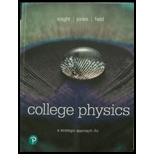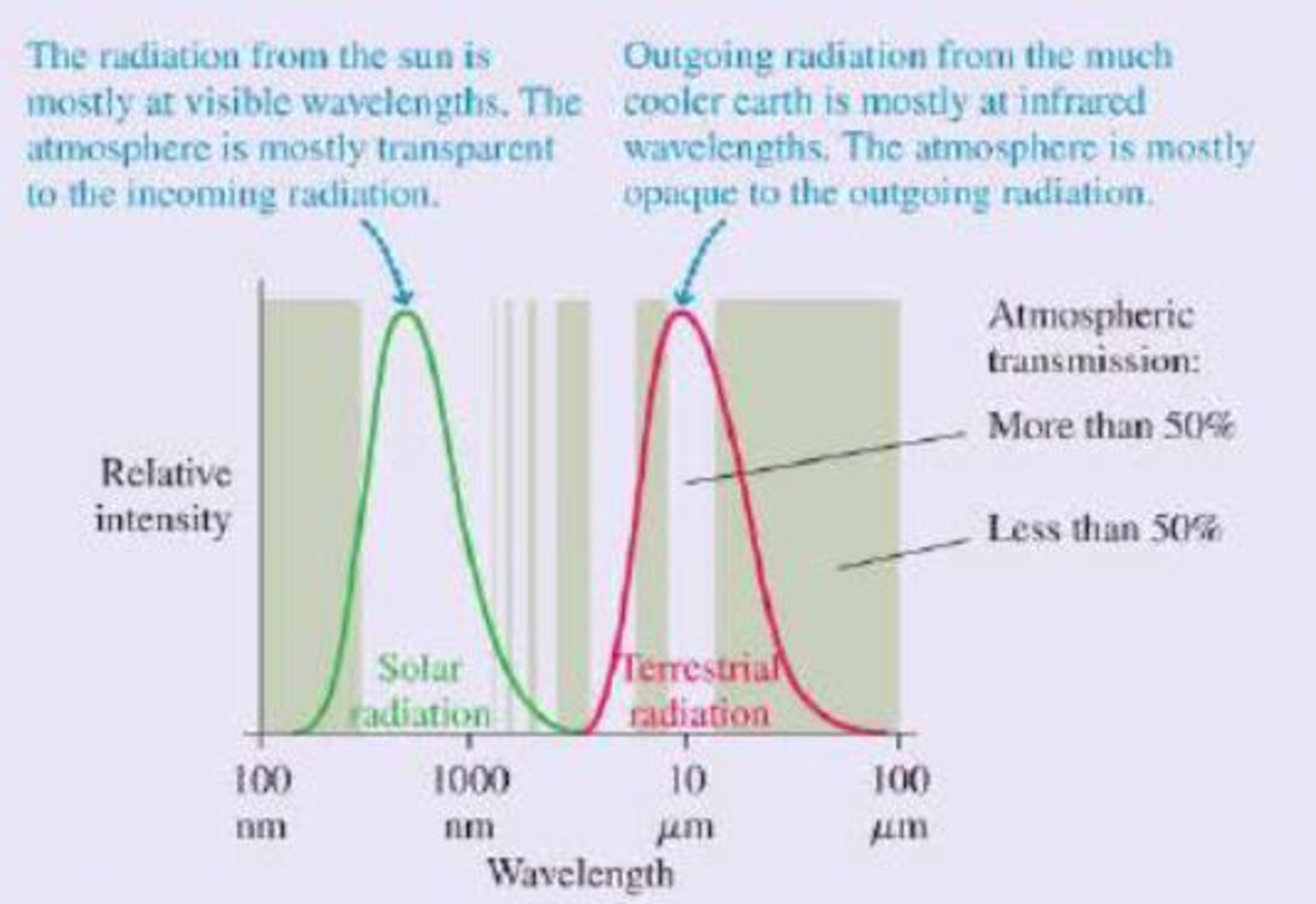
The Greenhouse Effect and Global Warming
Although seasons come and go, on average the earth’s climate is very steady. To maintain this stability, the earth must radiate thermal energy—electromagnetic waves—back into space at exactly the same average rate that it receives energy from the sun. Because the earth is much cooler than the sun, its thermal radiation is long-wavelength infrared radiation that we cannot see. A straightforward calculation using Stefan's law finds that the average temperature of the earth should be –18°C, or 0°F, for the incoming and outgoing radiation to lie in balance.
This result is clearly not correct; at this temperature, the entire earth would be covered in snow and ice. The measured global average temperature is actually a balmier 15°C, or 59°F. The straightforward calculation fails because it neglects to consider the earth’s atmosphere. At visible wavelengths, as the figure shows, the atmosphere has a wide “window” of transparency, but this is not true at the infrared wavelengths of the earth’s thermal radiation. The atmosphere lets in the visible radiation from the sun, but the outgoing thermal radiation from the earth sees a much smaller “window.” Most of this radiation is absorbed in the atmosphere.

Thermal radiation curves for the sun and the earth. The shaded bands show regions for which the atmosphere is transparent (no shading) or opaque (shaded) to electromagnetic radiation.
Because it’s easier for visible radiant energy to get in than for infrared to get out, the earth is warmer than it would be without the atmosphere. The additional warming of the earth’s surface because of the atmosphere is called the greenhouse effect. The greenhouse effect is a natural part of the earth’s physics; it has nothing to do with human activities, although it’s doubtful any advanced life forms would have evolved without it.
The atmospheric gases most responsible for the greenhouse effect are carbon dioxide and water vapor, both strong absorbers of infrared radiation. These greenhouse gases are of concern today because humans, through the burning of fossil fuels (oil, coal, and natural gas), are rapidly increasing the amount of carbon dioxide in the atmosphere. Preserved air samples show that carbon dioxide made up 0.027% of the atmosphere before the industrial revolution. In the last 150 years, human activities have increased the amount of carbon dioxide by nearly 50%, to about 0.040%. By 2050, the carbon dioxide concentration will likely increase to 0.054%, double the pre-industrial value, unless the use of fossil fuels is substantially reduced.
Carbon dioxide is a powerful absorber of infrared radiation. And good absorbers are also good emitters. The carbon dioxide in the atmosphere radiates energy back to the surface of the earth, warming it. Increasing the concentration of carbon dioxide in the atmosphere means more radiation: this increases the average surface temperature of the earth. The net result is global warming.
There is strong evidence that (he earth has warmed nearly 1°C in the last 100 years because of increased greenhouse gases. What happens next? Climate scientists, using sophisticated models of the earth’s atmosphere and oceans, calculate that a doubling of the carbon dioxide concentration will likely increase the earth’s average temperature by an additional 2°C (≈ 3°F) to 6°C (≈9°F) There is some uncertainty in these calculations; the earth is a large and complex system. Perhaps the earth will get cloudier as the temperature increases, moderating the increase. Or perhaps the arctic ice cap will melt, making the earth less reflective and leading to an even more dramatic
But the basic physics that leads to the greenhouse effect, and to global warming, is quite straightforward. Carbon dioxide in the atmosphere keeps the earth warm; more carbon dioxide will make it warmer. How much warmer? That’s an important question, one that many scientists around the world are attempting to answer with ongoing research. But large or small, change is coming. Global warming is one of the most serious challenges facing scientists, engineers, and all citizens in the 21st century.
The following questions are related to the passage “The Greenhouse Effect and Global Warming” on the previous page.
The intensity of sunlight at the top of the earth’s atmosphere is approximately 1400 W/m2. Mars is about 1.5 times as far from the sun as the earth. What is the approximate intensity of sunlight at the top of Mar’s atmosphere?
- A. 930 W/m2
- B. 620 W/m2
- C. 410 W/m2
- D. 280 W/m2
Want to see the full answer?
Check out a sample textbook solution
Chapter P Solutions
College Physics: A Strategic Approach (4th Edition)
Additional Science Textbook Solutions
Introductory Chemistry (6th Edition)
Human Biology: Concepts and Current Issues (8th Edition)
Microbiology with Diseases by Body System (5th Edition)
Campbell Biology (11th Edition)
Chemistry (7th Edition)
Campbell Essential Biology with Physiology (5th Edition)
- In the following figure the circuit to the left has a switch thatat t = 0 s is switched and disconnects the battery from the circuit. The state depicted on thefigure is right after the switch, still t = 0. As the current decreases over time, the magneticflux through the circuit on the right (due to the long cable of the circuit on the left) changesand induces an EMF on the right circuit. How much power is consumed by R2 as a functionof time.The distance between the wire on the left and the closest wire on the right is r = 2.0 cm.The size of the circuit on the right is noted on the figure.arrow_forwardsingly A samply ionized helium atom is in the ground state. It absorbs energy and makes a transition to the n=7 excited state. The ion returns to wo the wavelength the ground state by emitting SIX photons ONLY. What is the of the second highest energy photon ?arrow_forwardAn electron, traveling at a speed of 5.60x10° m/s, strikes the target of an X-ray tube. Upon impart, the eletion decelerates to one-third of it's original speed, with an X-ray photon being emitted in the process. What is the wavelength of the photon? m.arrow_forward
- Can you help me solve this 2 question and teach me what we use to solve thisarrow_forwardYou are working during the summer at a company that builds theme parks. The company is designing an electromagnetic propulsion system for a new roller coaster. A model of a substructure of the device appears in the figure below. Two parallel, horizontal rails extend from left to right, with one rail behind the other. A cylindrical rod rests on top of and perpendicular to the rails at their left ends. The distance between the rails is d and the length of the rails is L. The magnetic field vector B points vertically down, perpendicular to the rails. Within the rod, the current I flows out of the page, from the rail in the back toward the rail in the front. The rod is of length d = 1.00 m and mass m = 0.700 kg. The rod carries a current I = 100 A in the direction shown and rolls along the rails of length L = 20.0 m without slipping. The entire system of rod and rails is immersed in a uniform downward-directed magnetic field with magnitude B = 2.30 T. The electromagnetic force on the rod…arrow_forwardBased on the graph, explain how centripetal force is affected when the hanging mass changes. Does your graph verify the relationship in the equation r = x^i + y^j = r cos ωt I + r sin ωt^j?arrow_forward
- Can you help me to solve this two questions can you teach me step by step how to solve it.arrow_forwardGiven: ruler 11.56 g, small washer 1.85 g each, large washer 24.30g each Use the data in Data Tables 4 and 5 to experimentally determine the mass of your ruler. Use one of your 2 trials with 1 small washer at 0 cm, one of your 2 trials with 2 small washers at 0 cm, and one of your 2 trials with 3 small washers at 0 cm to find three experimental values for the mass of the ruler. How do you experimentalls determine the mass?arrow_forwardCompare the 3 experimental masses of your ruler to the measured mass of your ruler (Data Table 1) by calculating the percent error for each experimental value. Which trial provided the best data for determining the mass of the ruler? Please help, I am not sure how to calculate this. Thanks!arrow_forward
- Please help, everytime I try to input the data only one point shows on the graph. Please graph unsing centripetal force, Fc, versus V E2 from Activity 1. Include a line of best fit and record the equation of the line. Thank you!arrow_forwardPlease help, everytime I try to input the data only one point shows on the graph. Graph of centripetal force, Fc, versus V E2 from Activity 1. Include a line of best fit and record the equation of the line.arrow_forwardBased on your graph, explain how centripetal force is affected when the hanging mass changes. Does your graph verify the relationship in the equation r = x^i + y^j = r cos ωt I + r sin ωt^j?arrow_forward
 College PhysicsPhysicsISBN:9781938168000Author:Paul Peter Urone, Roger HinrichsPublisher:OpenStax College
College PhysicsPhysicsISBN:9781938168000Author:Paul Peter Urone, Roger HinrichsPublisher:OpenStax College Physics for Scientists and EngineersPhysicsISBN:9781337553278Author:Raymond A. Serway, John W. JewettPublisher:Cengage Learning
Physics for Scientists and EngineersPhysicsISBN:9781337553278Author:Raymond A. Serway, John W. JewettPublisher:Cengage Learning Physics for Scientists and Engineers with Modern ...PhysicsISBN:9781337553292Author:Raymond A. Serway, John W. JewettPublisher:Cengage Learning
Physics for Scientists and Engineers with Modern ...PhysicsISBN:9781337553292Author:Raymond A. Serway, John W. JewettPublisher:Cengage Learning
 Glencoe Physics: Principles and Problems, Student...PhysicsISBN:9780078807213Author:Paul W. ZitzewitzPublisher:Glencoe/McGraw-Hill
Glencoe Physics: Principles and Problems, Student...PhysicsISBN:9780078807213Author:Paul W. ZitzewitzPublisher:Glencoe/McGraw-Hill AstronomyPhysicsISBN:9781938168284Author:Andrew Fraknoi; David Morrison; Sidney C. WolffPublisher:OpenStax
AstronomyPhysicsISBN:9781938168284Author:Andrew Fraknoi; David Morrison; Sidney C. WolffPublisher:OpenStax





